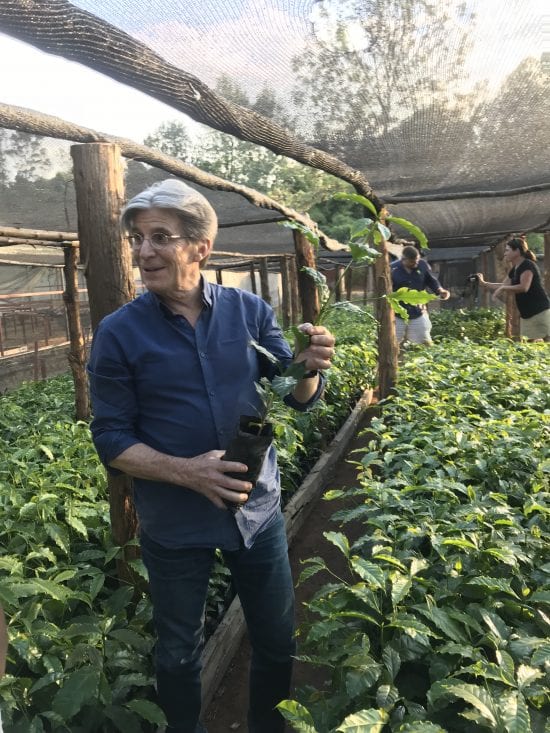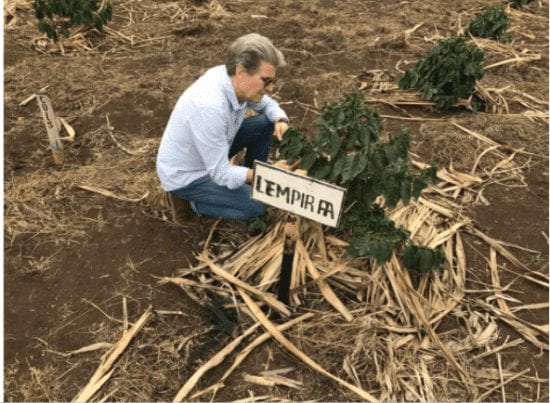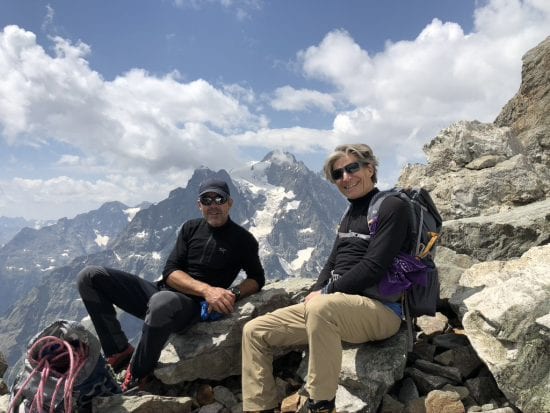
The founder of World Coffee Research was recently named the 2020 Sustainability Champion by the Specialty Coffee Association.
BY MARK VAN STREEFKERK
BARISTA MAGAZINE ONLINE
Over the span of Dr. Timothy Schilling’s 18-year career in coffee, he has helped elevate coffee from being an under-studied “orphan crop” to a higher level of research and development (R&D) not seen in the industry before. Timothy has a Ph.D. in plant breeding and genetics from North Carolina State University, but his journey in coffee began with his work in two USAID programs, PEARL and SPREAD. The goal of the programs was to generate food security and incomes for post-genocide Rwandan widows and orphans. While researching coffee quality in Rwanda, he was asked to present his findings at the first-ever SCA Symposium (now the Re:co Symposium) in 2009. A few years later he created World Coffee Research (WCR), a nonprofit global collaboration that uses science, technology, and genetics to ensure the sustainability of coffee, especially in the face of climate change, and increase profitability to coffee producers. Timothy served as CEO of WCR until last year and is now president of WCR Europe.

In this year’s Specialty Coffee Association Sustainability Awards announcement, the SCA stated, “The Sustainability Award Champion recognizes the work done by an individual in pursuit of a sustainable specialty-coffee sector throughout their career.” Timothy has most certainly done that. He joins Cooperative Coffees and Las Manos del Cafe, a project by RGC Coffee Inc., as business model and project sustainability award winners, respectively.
I had the honor of interviewing Tim recently via email, where we talked about his work with WCR, what’s next for coffee R&D, and his love of mountain sports.
This interview has been condensed for the sake of space.
Mark Van Streefkerk: I read that you were a presenter at the very first Re:co Symposium in 2009, a few years before World Coffee Research was founded. Looking back on that time, did you imagine you would be the CEO for a company that has done so much to advance science and research in coffee?
Timothy Schilling: Ha ha, it’s funny that you mention that because that first Re:co was really where WCR gelled in the consciousness of the coffee industry. I was asked to present results from some of the experiments we did in Rwanda to ensure high cup quality, and I think a lot of people said to themselves, “Damn, we need agricultural research if we intend to really move the needle on quality.” Of course, I didn’t imagine being CEO at that time. It was just an idea.

What are some reflections about your time with WCR? How have you seen the organization benefit coffee producers, and coffee itself? What are you most proud of?
Of course I’m super proud of laying the infrastructure and groundwork needed to build a WCR, but what I really enjoyed was “making stuff happen” for growers, origin country researchers, and roasting companies. Bringing those three segments of the industry together, to work together to improve coffee for everybody, was really fascinating and exciting. I remember being in Congo with a group of roasters one time, and we visited the IMLVT (International Multilocational Variety Trial), and it blew them away. They all kind of loosely knew about it but never really saw it, or touched it. They were amazed. They said they felt like they were seeing history in the making to see 30 different coffee varieties growing in a remote location in the Congo.
When you started delving into coffee, you considered it an “orphan crop” without a lot of the support of research—has that changed now?
Once an orphan, always an orphan. You can’t change what you are but you can sure make it a lot better. Many decades passed without significant resources devoted to coffee R&D in order to sustain the sector, in order to keep more good/better coffee coming. That’s slowly changing now. There is much more energy and resources devoted to coffee R&D today than 20 years ago, but it’s still under par. We have a huge and important industry that everybody loves, but we need to do lots more as an industry in the area of R&D.
What are some challenges coffee research will have to take on?
The biggest one is getting the funding necessary to conduct the work! That’s just the money part. Then there’s the challenge of getting the R&D results to the producers. There are about 12 million of them out there, and about 80% are small and don’t get the right technologies/varieties that could make both them and roasters thrive. There’s a HUGE disconnect between coffee R&D and coffee production. R&D is going hi-tech like I said, but coffee production for a lot of producers is stuck in the middle ages! This HAS to be fixed. WCR is working on it, but it’s bigger than just WCR.
Since you stepped down as CEO of WCR last year, what are you working on now, and what’s your next chapter?
First of all, I won’t be leaving coffee. I fell in love with it and it will remain part of me until the end. Right now I’m working with a group of professional coffee people on the development of a new espresso evaluation protocol that would allow us to evaluate different green coffees at origin for their ability to perform as espresso coffees. All our protocols for evaluating quality (and making purchase decisions) right now are geared to filter coffee. Having a protocol tuned to espresso may allow you to find “diamonds in the rough”—coffees that stand out as espresso but don’t perform well as filter coffee. That could create tremendous value for producers. This is also a method that is based on work done by UC Davis and Jean-Xavier Guinard and is more repeatable and precise than previous methods. My desire is somehow to continue to push the envelope through working with younger coffee professionals who want to do the same.

Lastly, what do you like to do outside of coffee?
Ha ha. Lots of stuff. I’m a big audiophile and enjoy trying to create a live music experience in my living room. I also do a lot of mountain sports. Here I am yesterday (in the above picture) at 3,400 meters on a glacier. It was a killer! Biking is also a big one for me since I was 20. Never stopped.

ABOUT THE AUTHOR
Mark Van Streefkerk is Barista Magazine’s social media content developer and a frequent contributor. He is also a freelance writer, social media manager, and novelist based out of Seattle. If Mark isn’t writing, he’s probably biking to his favorite vegan restaurant. Find out more on his website.
